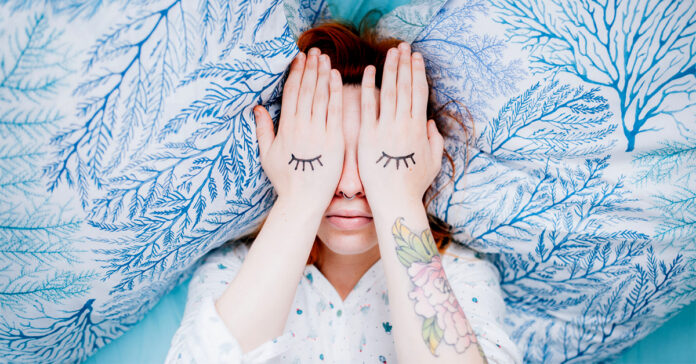If you’re having trouble sleeping or staying asleep, you’re not alone.
You may have heard sleep problems called insomnia, and unfortunately, they’re relatively common.
According to the American Sleep Association (ASA), around 30 percent of adults in the United States reported having short-term sleep problems, while another 10 percent say their insomnia is a chronic issue.
As getting insufficient sleep impacts nearly every aspect of life, you might be wondering how you can improve your sleep without using medication.
Well, we have good news: there are plenty of ways you may be able to get better sleep.
Keep reading to learn about 6 unique, drug-free remedies for when you can’t sleep!
- Create a Bedtime Routine
If you can’t sleep, it may be time to create a relaxing bedtime routine to help you wind down at the end of the day.
Try eliminating screen time like watching TV or browsing social media on your phone at least one hour before going to bed, as the blue light can stimulate your brain and keep you awake.
Instead, you might start a meditation routine, read a book, take an aromatherapy bath, or write in a journal. Some people find it helpful to make tomorrow’s to-do list before bed to reduce stress about the next day.
- Rethink What You Eat and Drink
After a long day, it’s tempting to treat yourself to a glass of wine or sugary dessert. However, as comforting as these indulgences may be, they can make it more challenging to get the rest you need.
Why?
Even if you feel sleepy after a sweet snack, sugar is a carbohydrate that gives a quick supply of energy to your brain. Your body might be exhausted, but sugar keeps your mind stimulated.
Similarly, many people enjoy having alcohol before bed due to its sedative effects. But in reality, alcohol interferes with the body’s ability to achieve and maintain a healthy sleep cycle.
- Adjust the Temperature
Sometimes, a simple temperature adjustment can resolve symptoms of insomnia.
Whether you adjust the thermostat, open a window, or purchase a portable fan, many people have found that keeping the room cooler is key to getting a fantastic night of rest.
Invest in bedding and pajamas made from natural, breathable fibers like cotton and silk for an even greater comfort upgrade.
- Reduce Excess Light
You may not be aware of it, but seemingly insignificant amounts of light can keep you awake.
Even with your eyes closed, light filtering in through the blinds, beaming from a television or digital alarm clock, and even the most noninvasive night lights are often stimulating enough to prevent proper relaxation.
Fortunately, excess light is usually a simple problem to solve.
You can purchase highly effective blackout curtains at nearly any home goods retailer. Turn off your devices at night and turn electronics with illuminated features away from your bed (or disable that feature entirely, if possible).
- Eliminate Nighttime Teeth Grinding and Jaw Clenching
Did you know? Major causes of sleep problems include conditions called bruxism (teeth grinding) and Temporomandibular Joint (TMJ) Disorder, which impact many people at night when they’re unaware of it. These two conditions can happen together, or you may just experience one of them.
Unintentional nighttime teeth grinding and jaw clenching can prevent you from sleeping or wake you up throughout the night. And your sleep isn’t the only thing harmed by these conditions: over time, teeth grinding and jaw clenching can lead to serious dental problems.
Preventing these tendencies with a quality, custom night guard has changed some peoples’ lives and allowed them to get the rest they need.
- Consider Drinking Herbal Tea
While there’s no conclusive research to link herbal tea to better sleep, people worldwide have enjoyed its soothing, aromatic effects as a natural remedy for ages.
Natural health experts believe that the calming and anti-inflammatory effects of plants like mint, chamomile, lavender, and ginger help soothe both the mind and body.
If you’re interested in trying herbal tea to find out if it might help you sleep, always check with your doctor first. Although herbal teas are generally considered safe and sold over-the-counter at grocery stores or specialty shops, some ingredients may aggravate certain health conditions or interact with medications.
Conclusion
There are few things more frustrating than having trouble sleeping. With the following day’s tasks looming overhead, you might be feeling both exhausted and stressed.
Luckily, everyone can try at least a few simple remedies we’ve discussed here to beat insomnia and start getting sufficient, restful sleep.
Good luck, and sweet dreams!











